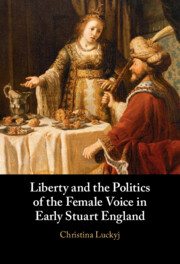Book contents
- Liberty and the Politics of the Female Voice in Early Stuart England
- Liberty and the Politics of the Female Voice in Early Stuart England
- Copyright page
- Dedication
- Contents
- Acknowledgments
- Notes on Texts
- Introduction
- Chapter 1 The Politics of the Female Voice
- Chapter 2 Conscience and Desire
- Chapter 3 Elizabeth Cary and the “Publike-Good”
- Chapter 4 “Not Sparing Kings”: Aemilia Lanyer
- Chapter 5 Rachel Speght and the “Criticall Reader”
- Chapter 6 Mary Wroth and the Politics of Liberty
- Chapter 7 “Yokefellow or Slave”: Anne Southwell
- Epilogue
- Index
Chapter 3 - Elizabeth Cary and the “Publike-Good”
Published online by Cambridge University Press: 24 February 2022
- Liberty and the Politics of the Female Voice in Early Stuart England
- Liberty and the Politics of the Female Voice in Early Stuart England
- Copyright page
- Dedication
- Contents
- Acknowledgments
- Notes on Texts
- Introduction
- Chapter 1 The Politics of the Female Voice
- Chapter 2 Conscience and Desire
- Chapter 3 Elizabeth Cary and the “Publike-Good”
- Chapter 4 “Not Sparing Kings”: Aemilia Lanyer
- Chapter 5 Rachel Speght and the “Criticall Reader”
- Chapter 6 Mary Wroth and the Politics of Liberty
- Chapter 7 “Yokefellow or Slave”: Anne Southwell
- Epilogue
- Index
Summary
challenges the still-influential view of Cary as a Catholic writer, arguing instead for her association with reform-minded men such as Spenserian John Davies and parliamentarians such as her father Lawrence Tanfield, who were defending the liberties of the subject when Cary was producing her drama. Opening up questions about the right to free speech and debate guaranteed by English common law, Cary’s Tragedy of Mariam (1613) allows quasi-legal arguments to multiply on either side until reaching a resolution by juxtaposing characters who scorn the common law with those who articulate its fundamental principles. For Members of Parliament, as for Mariam, freedom to speak one’s conscience was an inalienable right equivalent to owning property (or, in Mariam’s case, owning her body and independent lineage); in Mariam, as in Parliament, those rights are asserted in defiance of the royal prerogative to silence them.
Keywords
- Type
- Chapter
- Information
- Publisher: Cambridge University PressPrint publication year: 2022

